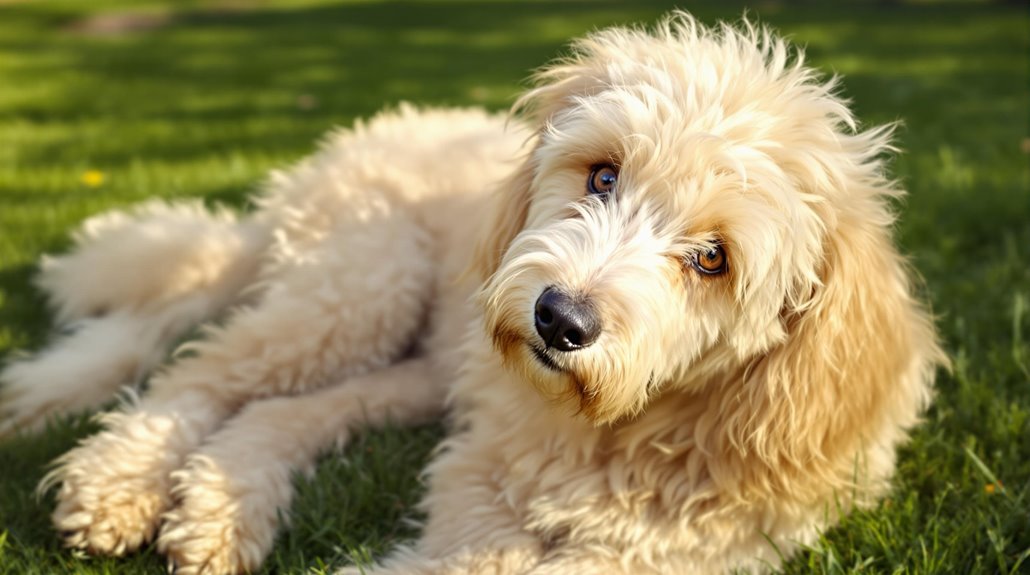Pyredoodles combine the intelligence of Standard Poodles with the protective nature of Great Pyrenees, making them ideal for active families. You'll need to commit to regular grooming twice weekly and professional trims every 6-10 weeks for their hypoallergenic coat. These gentle giants stand 22-32 inches tall, weigh 85-100 pounds, and require 30-60 minutes of daily exercise plus mental stimulation. They're great with kids and pets but need early training and socialization. While annual vet costs average $1,200+, their 10-12 year lifespan offers plenty of loyal companionship. Understanding their specific needs will help you determine if this smart, protective breed matches your lifestyle.
Understanding the Pyredoodle Breed
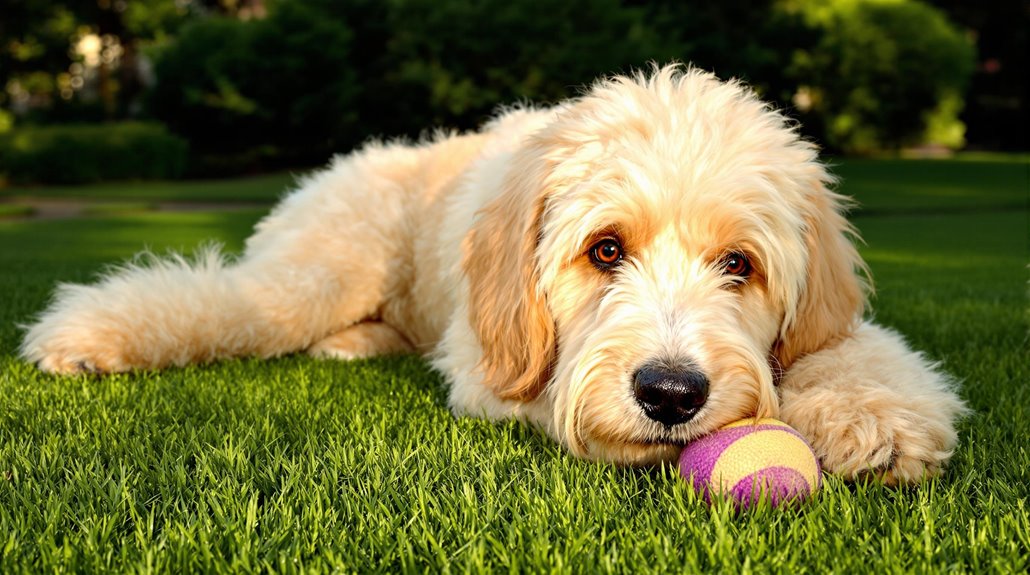
Many dog lovers seek the perfect combination of intelligence, gentleness, and low-shedding qualities in their pets – and the Pyredoodle delivers on all counts. These gentle giants result from crossing Great Pyrenees with Standard Poodles, creating a remarkable companion that combines the best traits of both breeds.
You'll find that Pyredoodles typically reach impressive dimensions:
- Height: 22 to 32 inches
- Weight: 85 to 100 pounds
- Build: Large and well-proportioned
Their size makes them ideal for families with spacious homes, while their gentle nature guarantees they're excellent with children. You'll appreciate their hypoallergenic coat, which comes in various colors:
- Black
- White
- Gray
- Apricot
- Cream
When you're considering a Pyredoodle, it's important to understand their grooming needs. You'll need to commit to regular brushing sessions – at least weekly – to prevent matting and maintain their coat's health. These dogs inherit the Standard Poodle's intelligence and the Great Pyrenees' protective instincts, making them both capable guardians and affectionate family members.
Physical Traits and Characteristics
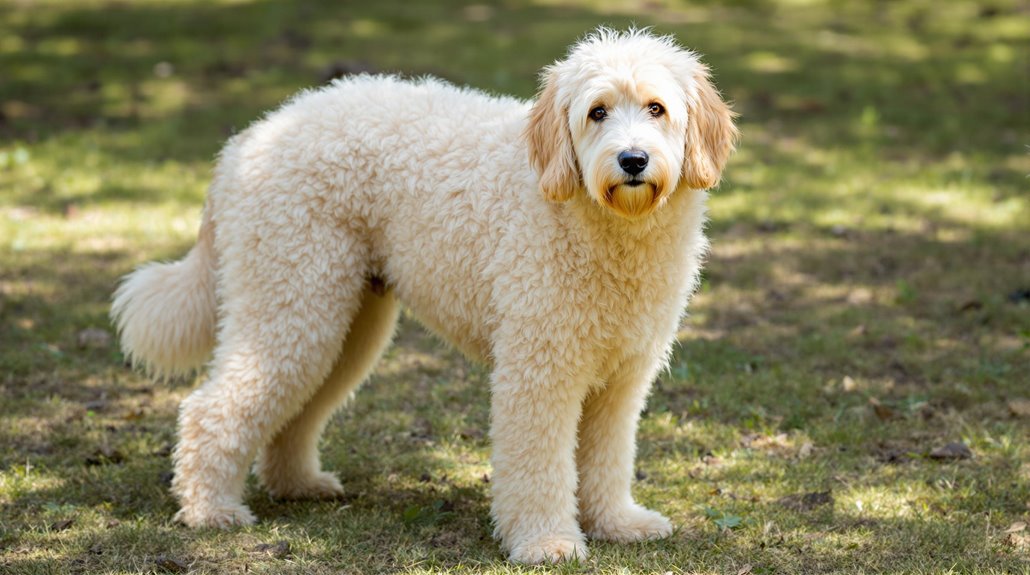
The physical traits of Pyredoodles stand out from among other designer breeds, thanks to their impressive size and elegant appearance. You'll find these gentle giants standing between 22 to 32 inches tall and weighing 85 to 100 pounds, making them a substantial large breed companion for your family.
One of their most distinctive features is their coat, which can be either curly or wavy in texture. If you're concerned about allergies, you'll appreciate that their fur is low-shedding and hypoallergenic. Their coat colors offer plenty of variety, including:
- Black
- White
- Gray
- Apricot
- Cream
When you're considering a Pyredoodle, keep in mind that their appearance can vary considerably due to their mixed heritage. Some dogs may display more Great Pyrenees characteristics, while others might take after their Poodle parentage. Regardless of which parent they favor, you can expect a dog with a majestic presence and sturdy build. Their regal bearing and elegant stance make them impressive additions to any home, combining both strength and grace in their physical structure.
Training Your Gentle Giant

Starting early with training your Pyredoodle is essential for developing a well-behaved adult dog. You'll want to establish basic commands like sit, stay, and come while your puppy is young and receptive to learning new behaviors.
Here's what you'll need to focus on for successful training:
- Implement "hush" and "quiet" commands early to manage protective barking tendencies
- Begin socialization immediately to help your puppy become comfortable with new people and situations
- Use positive reinforcement techniques, rewarding good behavior with treats and praise
- Establish consistent leash training routines to guarantee safe, enjoyable walks
- Include crate training to provide your dog with a secure personal space
Your Pyredoodle will respond best to gentle guidance and encouragement rather than harsh corrections. Creating a structured training schedule helps your dog understand expectations while building a strong bond between you both. Remember to keep training sessions short and engaging, making them a positive experience for your puppy.
As your Pyredoodle grows, continue reinforcing these early lessons to maintain good behavior patterns. Consistency in your training approach will help shape a well-mannered companion who's a joy to have in your home.
Health and Wellness Priorities
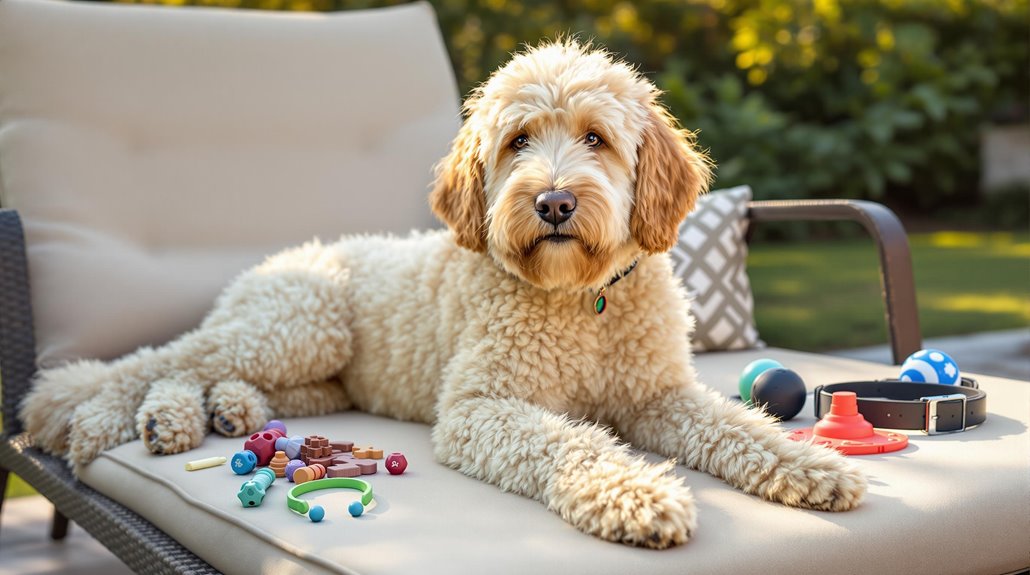
To protect your investment in your dog's health:
- Brush teeth weekly to prevent dental issues
- Clean and check ears regularly to prevent infections
- Maintain a consistent grooming schedule to avoid matting
- Consider pet insurance to cover unexpected medical expenses
With proper care and attention to these health priorities, your Pyredoodle can enjoy a healthy life spanning up to 12 years. Early intervention and preventive measures will help manage potential genetic conditions effectively.
Grooming Requirements and Tips
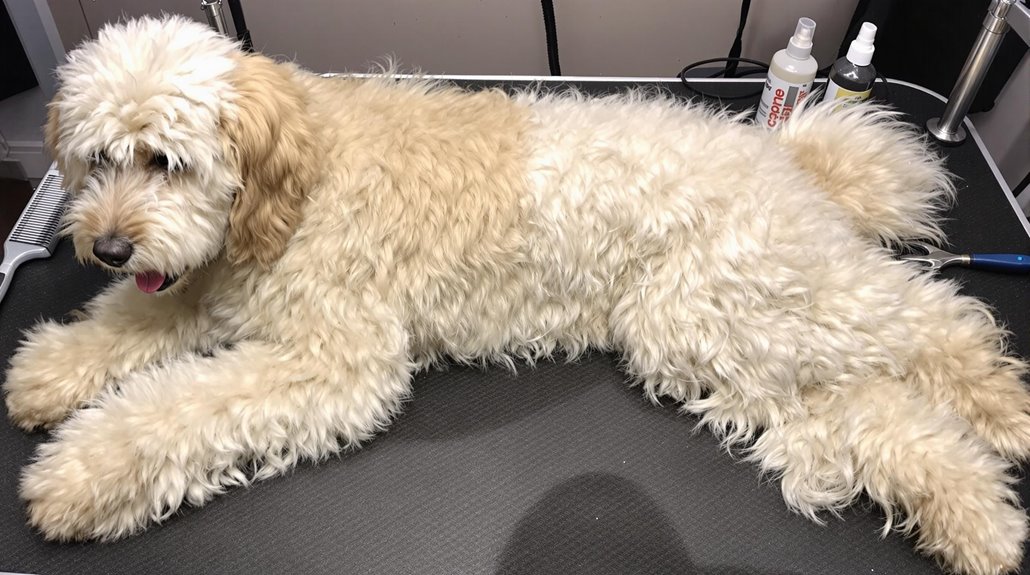
Maintaining your Pyredoodle's coat requires dedicated attention beyond basic health routines. While their low shedding coat makes them an excellent choice for allergy sufferers, you'll need to commit to regular grooming to keep their fur in prime condition.
You'll want to establish a consistent grooming schedule that includes:
- Professional grooming every 6-10 weeks to prevent matting
- Weekly brushing for single-coated Pyredoodles
- Daily brushing if your dog has a double coat
- Monthly nail trimming to maintain proper paw health
When it comes to bathing your Pyredoodle, less is more. Excessive bathing can strip their coat of natural oils, leading to dry skin issues. Instead, focus on regular brushing to distribute these oils and remove debris.
To maintain peak coat health:
- Use appropriate brushes and combs for their specific coat type
- Check for matting behind ears and in armpits regularly
- Keep up with dental hygiene alongside coat care
- Consider professional grooming services for complex coat maintenance
Exercise and Activity Needs
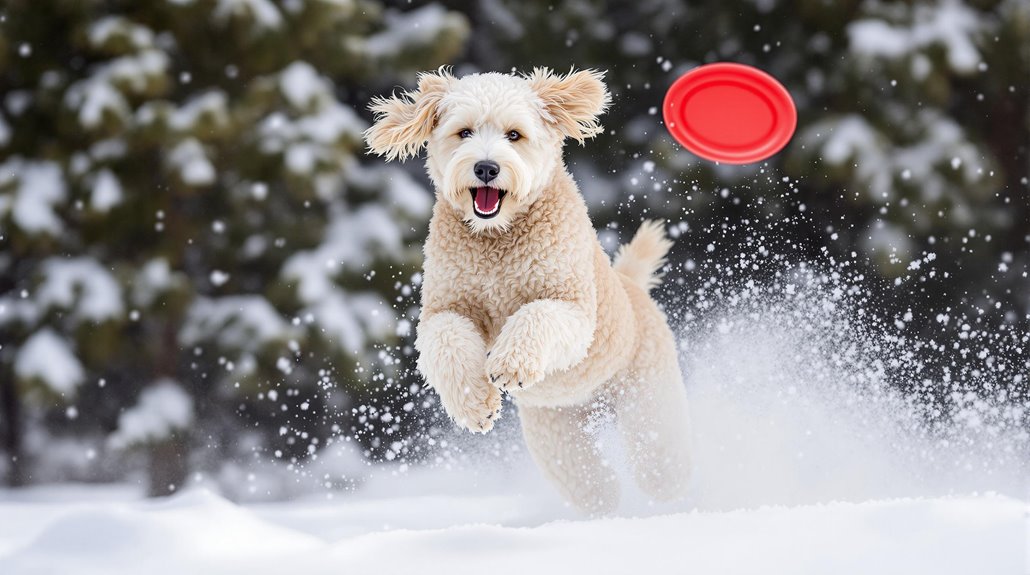
With a blend of Great Pyrenees and Poodle genetics, Pyredoodles possess substantial energy levels that require dedicated daily exercise. You'll need to commit to 30-60 minutes of physical activity each day to keep your Pyredoodle healthy and prevent weight-related issues.
To meet your Pyredoodle's activity needs, you should:
- Aim for about 7 miles of exercise weekly through varied activities
- Include walks, jogs, or swimming sessions in their routine
- Wait at least an hour after meals before exercising to prevent bloat
- Provide interactive toys and puzzles for mental stimulation
Mental engagement is just as important as physical exercise for your Pyredoodle. You'll want to incorporate brain games and training sessions to prevent boredom and destructive behaviors. These intelligent dogs thrive when given tasks that challenge both their minds and bodies.
Remember to monitor your dog's energy levels and adjust the exercise routine accordingly. While they need regular activity, you shouldn't overexert them, especially in hot weather. A well-exercised Pyredoodle is more likely to be calm and well-behaved in your home.
Living With a Pyredoodle
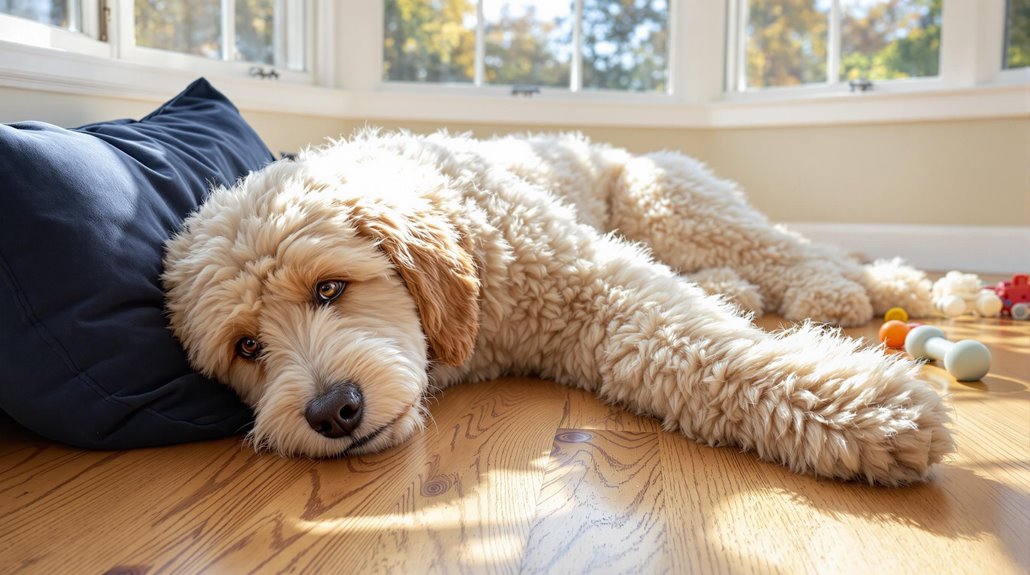
Living with a Pyredoodle requires dedication to their physical, emotional, and social needs. As a gentle giant, your Pyredoodle will need consistent attention to thrive in your home environment, whether you're in a house or apartment.
Early socialization is essential for Pyredoodle owners who want to raise a well-adjusted companion. You'll need to expose your dog to various people, pets, and situations during their formative months to develop their friendly temperament.
Key aspects of daily life with your Pyredoodle include:
- Providing 30-60 minutes of exercise daily to maintain their health and prevent weight gain
- Ensuring adequate indoor space for movement, even in apartment settings
- Establishing a regular grooming schedule every 6-10 weeks to maintain their hypoallergenic coat
- Creating opportunities for social interaction with family members and other pets
Your Pyredoodle's adaptable nature makes them excellent family companions, but they'll depend on you for structure and care. While they can adjust to various living situations, you'll need to commit to regular grooming sessions and consistent exercise routines to keep them healthy and happy.
Family and Pet Compatibility
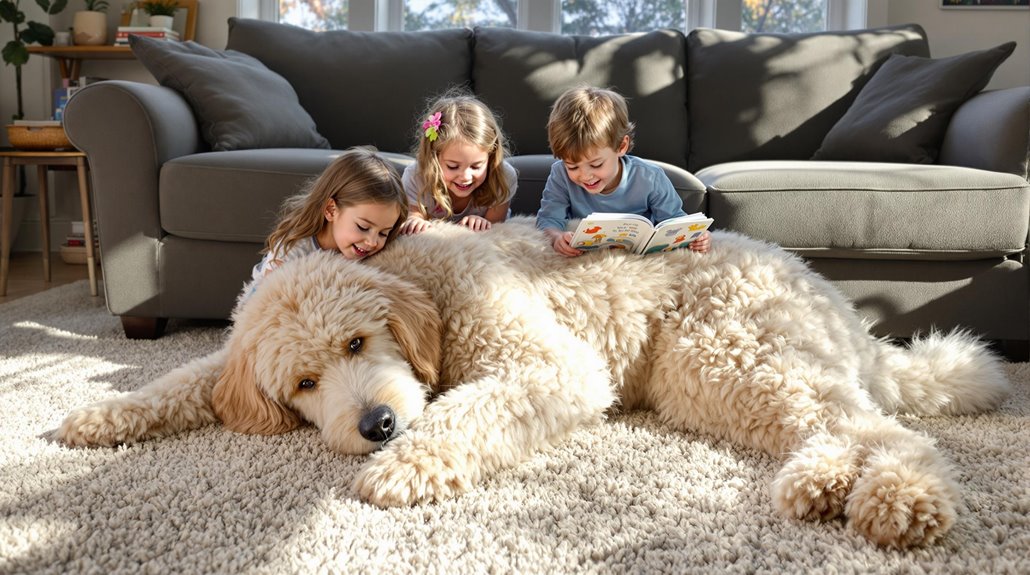
For families with allergy concerns, Pyredoodles offer an added benefit through their hypoallergenic coat inherited from their Poodle parentage. You'll experience less shedding compared to traditional breeds, though regular grooming remains important for maintaining their coat health.
Remember to provide:
- Consistent early training
- Regular social interactions
- Adequate exercise opportunities
- Positive family experiences
Finding Your Perfect Match

Before choosing a Pyredoodle, you'll want to assess if this large, gentle breed aligns with your lifestyle. Finding your perfect match requires careful consideration of your living space, as these dogs need room to move with their 85-100 pound frames.
Consider these key factors when making your decision:
- Living Space: You'll need a home with adequate room for a large breed that stands up to 32 inches tall
- Allergy Concerns: Their hypoallergenic coat makes them suitable if you or family members have allergies
- Time Commitment: Plan for 10-12 years of unconditional love and care, including regular exercise
- Activity Level: Your household should be active enough to provide daily physical and mental stimulation
- Training Dedication: You must commit to early socialization and consistent training
While Pyredoodles typically have fewer health issues than their parent breeds, you'll still need to:
- Budget for routine veterinary care
- Maintain regular grooming sessions
- Provide proper nutrition for their size
- Schedule regular exercise sessions
If you can meet these requirements and have the space for a large, protective companion, a Pyredoodle might be your ideal match.
Cost and Care Considerations
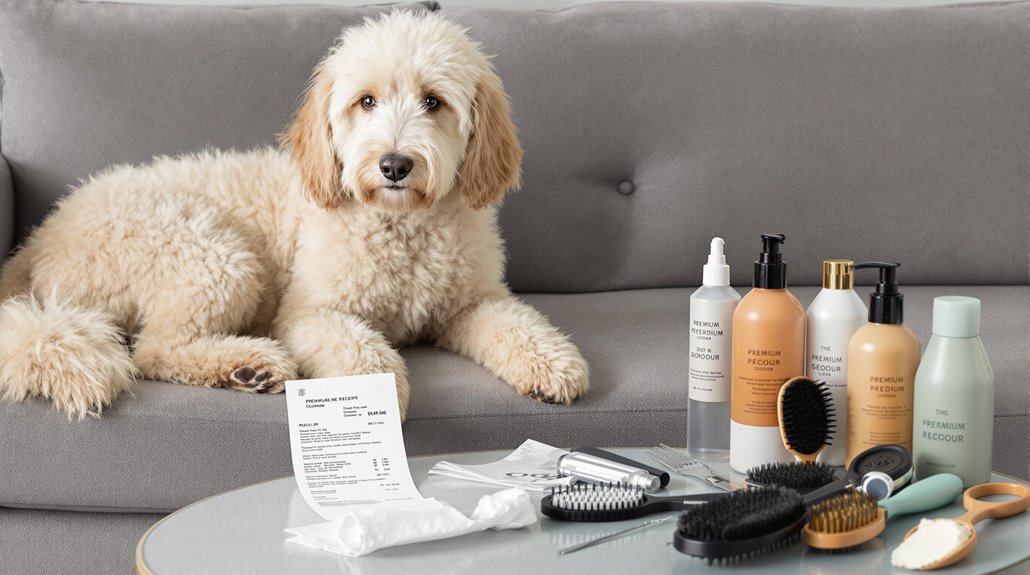
Along with their loving nature, Pyredoodles come with significant financial responsibilities that you'll need to contemplate. Initial costs range from $1,000 to $2,500 when purchasing from reputable breeders, while adoption offers a more affordable option at $300 to $800.
Your Pyredoodle's ongoing care requires careful planning:
- Diet Requirements
- High-quality protein-rich dry food
- 1,670 daily calories for puppies
- 2,200 daily calories for adults
- Exercise Needs
- 30-60 minutes of daily activity
- Regular exercise prevents obesity
- Helps maintain overall health
- Grooming Expenses
- Regular brushing to prevent matting
- Professional grooming every 6-10 weeks
- Costs vary based on coat type
- Health Considerations
- Prone to specific health conditions like bloat and hip dysplasia
- Pet insurance recommended for unexpected issues
- Regular vet check-ups essential
You'll need to factor these expenses into your budget to guarantee you can provide proper care throughout your Pyredoodle's life. Remember that investing in preventive care can help reduce long-term health costs and maintain your dog's well-being.
Designer Guard Dog Hybrid
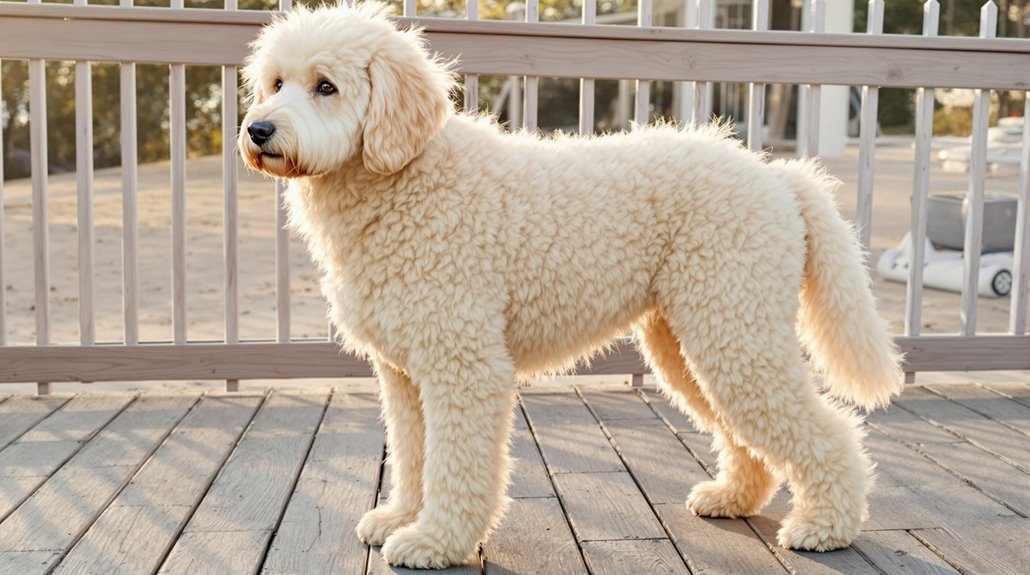
You'll find the Pyredoodle's protective instincts shine through in their role as natural watchdogs, making them excellent guardians while maintaining their affectionate nature. Their unique combination of Poodle intelligence and Great Pyrenees protective traits creates a smart, capable hybrid that can quickly assess potential threats. The breed's balanced temperament means you're getting the best qualities of both parent breeds – the Poodle's trainability with the Great Pyrenees' instinct to guard and protect your family.
Protection Instincts Stay Strong
From the moment they enter your home, Pyredoodles demonstrate their exceptional protective instincts inherited from their Great Pyrenees ancestry. These loyal dogs combine their natural alertness with proper socialization to create an effective guardian for your family and property.
You'll find your Pyredoodle's guard dog abilities stem from several key traits:
- Natural Vigilance: They'll consistently monitor their surroundings and bark to alert you of potential threats or unfamiliar visitors.
- Imposing Presence: With their substantial size of 80-110 pounds, they serve as an effective visual deterrent while maintaining a gentle demeanor with family.
- Balanced Protection: Their Great Pyrenees lineage provides independent guarding instincts, while Poodle genetics contribute to their trainability and responsiveness.
To maximize your Pyredoodle's protective nature:
- Begin socialization early to help them distinguish between welcome guests and genuine threats
- Reinforce positive interactions with approved visitors
- Maintain consistent training to channel their protective instincts appropriately
Your Pyredoodle will serve as both a devoted family companion and reliable protector, offering peace of mind through their natural guarding abilities.
Smart Yet Protective Nature
Building upon their natural protective instincts, Pyredoodles showcase a remarkable blend of intelligence and vigilance that makes them standout designer guard dogs. You'll find these smart hybrids excel at learning commands while maintaining their protective nature.
The combination of Standard Poodle intelligence and Great Pyrenees watchdog traits creates a dog that's both easy to train and naturally protective. You can count on your Pyredoodle to:
- Master guard-related commands quickly
- Distinguish between welcome guests and potential threats
- Remain loyal to family members while staying alert to strangers
- Adapt to your household's specific security needs
Early socialization plays an essential role in developing your Pyredoodle's protective qualities. You'll want to expose them to various situations and people during their formative months to guarantee they're confident and well-adjusted. This approach helps prevent over-protective behaviors while maintaining their natural guarding instincts.
As an added benefit, you won't have to worry about excessive shedding or allergies while your Pyredoodle stands guard. Their hypoallergenic coat makes them an ideal choice for families seeking a protective companion without common allergen concerns.
Best Of Both Breeds
When it comes to designer guard dogs, Pyredoodles represent the perfect fusion of their parent breeds' most desirable traits. You'll get the best protective instincts from the Great Pyrenees combined with the intelligence and trainability of the Standard Poodle in one remarkable companion.
These versatile dogs deliver impressive physical attributes that serve both form and function. Standing 22 to 32 inches tall and weighing between 85 to 100 pounds, they maintain a commanding presence that naturally deters unwanted visitors. You'll appreciate their hypoallergenic coat, inherited from their Poodle lineage, which makes them an excellent choice for family members with allergies.
What truly sets Pyredoodles apart is their balanced temperament. With proper early training, you'll find they're:
- Naturally protective yet gentle with family members
- Smart and highly trainable for various household roles
- Excellent with children and other pets
- Affectionate while maintaining guard dog instincts
- Adaptable to different living situations
This thoughtful combination of traits makes Pyredoodles an ideal choice if you're seeking a family guardian that offers both protection and companionship without compromising on either quality.
Designer Hybrid Protector
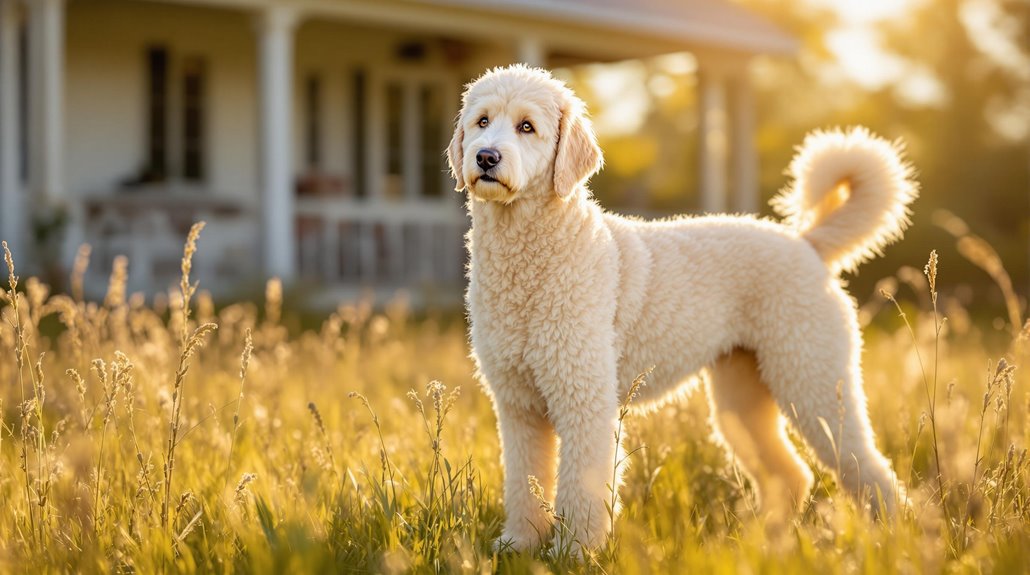
The Pyredoodle stands out as a remarkable designer hybrid that combines the best protective qualities of both parent breeds. This Great Pyrenees and Poodle mix brings together the vigilant guardian instincts of a working dog with the intelligence of a highly trainable companion. You'll find that these designer mixed breed dogs excel at keeping watch over your family while maintaining a gentle, loving disposition.
When you welcome a Pyredoodle into your home, you're getting more than just a protective presence. Their hypoallergenic coat makes them an ideal choice if you or your family members struggle with allergies. At 80 to 110 pounds, they're substantial enough to deter threats but adaptable enough to fit into your family dynamic.
To make the most of your Pyredoodle's protective nature, you'll want to focus on early socialization. This vital step helps develop their confidence and guarantees they'll be discerning guardians rather than overly suspicious ones. With proper training, your Pyredoodle will know when to be watchful and when to relax, making them excellent family protectors who can adjust to various social situations.
Muscular, Broad-Chested Frame
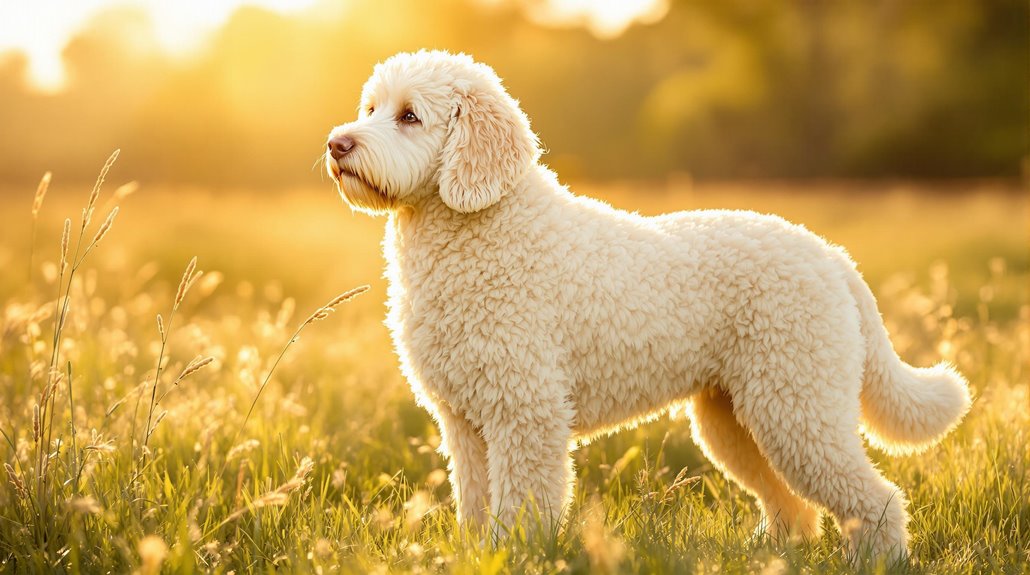
When you look at a male Pyredoodle, you'll notice their impressive muscular frame that can reach 85-100 pounds at maturity. Their broad chest and strong build are covered in dense, wavy fur that's hypoallergenic, making them suitable for allergy-prone families. You'll need to schedule regular professional grooming appointments to maintain their distinctive coat, which requires consistent care to prevent matting and keep their athletic physique visible.
Males Reach 85-100 Pounds
Male Pyredoodles pack a powerful presence, weighing in at 85 to 100 pounds when fully grown. This substantial size comes from their Great Pyrenees heritage, making them impressive members of the large dog family. Standing 22 to 32 inches tall, these gentle giants combine strength with grace in their muscular build.
If you're considering bringing a male Pyredoodle into your home, you'll need to prepare for their space requirements. Their broad-chested frame and substantial size mean they'll need:
- Wider doorways and passages for comfortable movement
- Spacious living areas to prevent bumping into furniture
- Large, sturdy beds that support their weight
- Roomy vehicles for transportation
- Extra floor space for stretching out
Their size isn't just about numbers – it's about functionality and comfort in your home. As a blend of Great Pyrenees and Standard Poodle genetics, male Pyredoodles maintain an elegant bearing despite their impressive mass. You'll want to guarantee your living space can accommodate their physical presence while allowing them to move freely and comfortably throughout their daily activities.
Dense, Wavy Hypoallergenic Fur
Complementing their impressive size, Pyredoodles boast a luxurious coat that's both dense and wavy, making them an excellent choice for allergy-sensitive homes. Their hypoallergenic fur considerably reduces dander in your living space, allowing you to enjoy your pet without the typical allergy concerns that come with many other breeds.
You'll find that Pyredoodle coats can vary between individuals, with some inheriting the Poodle's tight curls while others display the flowing waves characteristic of the Great Pyrenees. To maintain your dog's coat health, you'll need to commit to regular grooming sessions every 6-10 weeks. This maintenance helps prevent matting and keeps their dense fur in ideal condition.
The combination of their muscular frame and distinctive coat creates a striking appearance that's both functional and beautiful. When you're considering a Pyredoodle, remember that their hypoallergenic qualities make them particularly well-suited for families who want to serve others through therapy work or assistance roles, as their reduced allergen production allows them to interact comfortably with diverse groups of people.
Regular Professional Haircuts Needed
A Pyredoodle's muscular frame and broad chest require special attention when it comes to professional grooming. Their dense coat needs proper care to maintain its hypoallergenic properties and prevent matting, especially around their muscular body structure.
You'll need to schedule professional grooming appointments every 6-10 weeks to keep your Pyredoodle's coat healthy and manageable. Regular visits to a groomer help monitor your dog's skin condition and catch potential issues early. Since these dogs have thick coats that can trap dirt and debris, staying on top of grooming is critical for their comfort and well-being.
Key grooming requirements:
- Professional haircuts at 6-10 week intervals
- Specialized grooming techniques for their unique coat type
- Extra attention to areas around their broad chest and muscular frame
- Customized grooming schedule based on individual coat thickness
Your groomer will work with you to establish the right grooming frequency for your Pyredoodle, as some may need more frequent visits if they have a thicker double coat. This consistent care guarantees your dog stays comfortable while maintaining their distinctive appearance and coat health.
Protective yet Gentle Giants
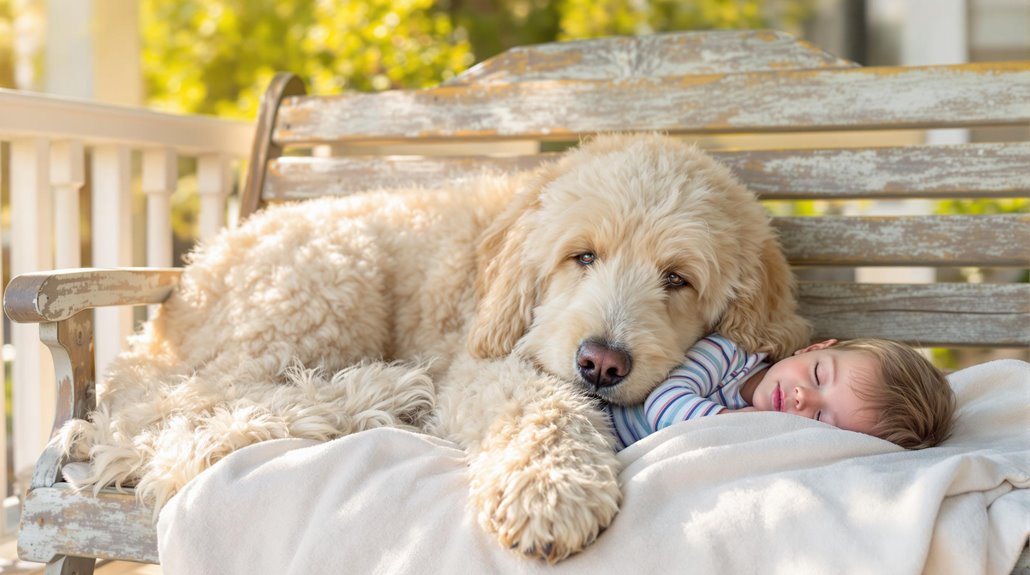
Your Pyredoodle's protective yet gentle nature means you'll find them enthusiastic to learn commands while remaining patient enough to play with young children. You'll need to provide about 60 minutes of daily exercise to keep their intelligent minds engaged and their strong bodies healthy. These devoted family guardians will balance their watchdog instincts with a remarkably gentle disposition, making them ideal companions for active households with children.
Eager to Master Commands
These intelligent giants combine the quick-learning abilities of Poodles with the protective nature of Great Pyrenees, making them exceptionally responsive to training commands. You'll find that their enthusiastic to please personality shines through during training sessions, especially when you use positive reinforcement techniques.
To help your Pyredoodle become a well-socialized dog, consider these key training approaches:
- Start early socialization and training to build confidence and proper responses
- Use interactive toys and puzzles for mental stimulation
- Maintain consistent training routines to manage stubborn tendencies
- Reward good behavior to reinforce command mastery
Your Pyredoodle's intelligence requires regular mental challenges to prevent boredom and maintain engagement. While they excel at learning commands, you'll need to provide structured training sessions that balance their protective instincts with obedience requirements.
Remember that these dogs thrive on mental exercises as much as physical activity. By incorporating daily training practices and puzzle toys into their routine, you'll help your Pyredoodle develop into a well-mannered companion who reliably responds to commands while maintaining their natural protective traits.
Patient With Young Children
When it comes to family life, Pyredoodles shine as patient protectors who form incredible bonds with young children. Their gentle and affectionate nature makes them perfect companions for families seeking a watchful yet nurturing pet.
You'll appreciate how these gentle giants balance their protective instincts with a remarkable tolerance for children's activities. They're naturally calm and patient, making them ideal playmates who understand the need for gentleness around little ones.
Key benefits for families with children:
- Natural protective instincts keep your children safe while maintaining a gentle demeanor
- Low-shedding, hypoallergenic coat makes them suitable for children with allergies
- Exceptional patience during playtime and family activities
- Strong nurturing instincts toward young family members
To guarantee the best relationship between your Pyredoodle and children, you'll need to focus on early socialization. This essential step helps your dog develop:
- Confidence in various situations
- Appropriate reactions to children's movements and sounds
- Friendly behavior toward visitors and other pets
- Proper boundaries during play sessions
With proper training, you'll find your Pyredoodle becomes an attentive, loving guardian who naturally adjusts their behavior to protect and nurture your children.
Needs 60-Minute Daily Exercise
Meeting a Pyredoodle's exercise needs requires dedication to daily physical activity, typically ranging from 30 to 60 minutes. You'll need to incorporate regular activities like walking, jogging, or swimming to help your Pyredoodle maintain a healthy weight and energy balance.
As large dogs with protective instincts, Pyredoodles thrive when they have:
- Daily outdoor activities in spacious areas
- Interactive play sessions to prevent boredom
- Mental stimulation through puzzle toys and training
- Access to a fenced yard for supervised exercise
You'll want to establish a consistent exercise routine that includes:
- Morning walks (20-30 minutes)
- Afternoon play sessions (15-20 minutes)
- Evening activities for mental engagement (15-20 minutes)
Remember that these intelligent dogs need both physical exercise and mental challenges to stay balanced. Without proper daily exercise, your Pyredoodle may develop unwanted behaviors due to pent-up energy levels. If you're considering this breed, guarantee you can commit to providing regular outdoor activities and have access to suitable exercise spaces to keep your companion healthy and content.
Hip Dysplasia Risks

While your Pyredoodle's 10-12 year lifespan can be impacted by inherited health conditions, you'll need to watch for both hip dysplasia and eye problems like cataracts. You should monitor your dog's joint health closely, as both parent breeds commonly pass down hip issues that can affect mobility and quality of life. Regular joint supplements, combined with proper weight management and exercise, can help support your Pyredoodle's joint health throughout their life.
Eye Problems and Cataracts
As potential Pyredoodle owners, you'll need to monitor your dog's eye health closely, since these hybrid dogs can inherit various eye problems from both parent breeds. Cataracts are particularly common in Pyredoodles and can develop as they age, potentially affecting their quality of life and daily activities.
To guarantee your Pyredoodle maintains healthy vision throughout their life, consider these essential care steps:
- Schedule regular veterinary check-ups focused on eye health
- Watch for signs of vision changes or eye discomfort
- Report any unusual eye discharge or cloudiness to your vet immediately
- Consider genetic testing before adoption to understand potential risks
Early detection is vital when it comes to managing eye problems in Pyredoodles. Your veterinarian can identify developing issues before they become severe, allowing for more effective treatment options. While some eye conditions may be inevitable due to genetic predisposition, responsible breeding practices can help reduce these risks in future generations.
When choosing a Pyredoodle puppy, work with breeders who perform thorough health screenings on parent dogs and can provide documentation of eye health clearances. This diligence helps guarantee you're giving your future companion the best possible start in life.
0-12 Year Lifespan Average
Throughout their lives, Pyredoodles typically live between 10 to 12 years, though hip dysplasia can greatly impact their quality of life and mobility. If your Pyredoodle inherits more Great Pyrenees traits, you might notice a slightly shorter average lifespan of 8 to 10 years.
To help your Pyredoodle live a comfortable life, you'll need to be proactive about hip dysplasia prevention and management:
- Schedule regular veterinary check-ups to detect early signs of hip problems
- Limit jumping and intense exercise during your puppy's growth phase
- Maintain a healthy weight to reduce stress on hip joints
- Consider joint supplements as recommended by your vet
While mixed breeds like the Pyredoodle often benefit from genetic diversity, they're still at risk for hip dysplasia since both parent breeds commonly carry this condition. You can help your dog stay active longer by:
- Providing appropriate exercise that doesn't strain the joints
- Using ramps instead of stairs when possible
- Starting physical therapy early if signs of hip problems appear
- Working closely with your vet to develop a long-term management plan
Your vigilance in these areas can markedly improve your Pyredoodle's quality of life throughout their years with you.
Regular Joint Supplement Administration
From an early age, your Pyredoodle needs regular joint supplements to combat their heightened risk of hip dysplasia. This common condition, inherited from their Great Pyrenees parent, can lead to mobility issues and arthritis as your dog ages.
To protect your Pyredoodle's joint health, you'll want to:
- Start glucosamine and chondroitin supplements early in their life
- Maintain consistent dosing as recommended by your veterinarian
- Monitor their response to supplements over time
Your veterinarian will help determine the right supplement dosages based on your Pyredoodle's specific needs, size, and overall health condition. They'll create a tailored plan that maximizes the benefits of joint supplements while ensuring safety.
Remember that supplements work best as part of a thorough approach to joint care:
- Keep your dog at a healthy weight through proper nutrition
- Provide regular, appropriate exercise
- Schedule regular vet check-ups to monitor joint health
- Adjust supplement dosages as needed throughout their life
Brush Twice per Week
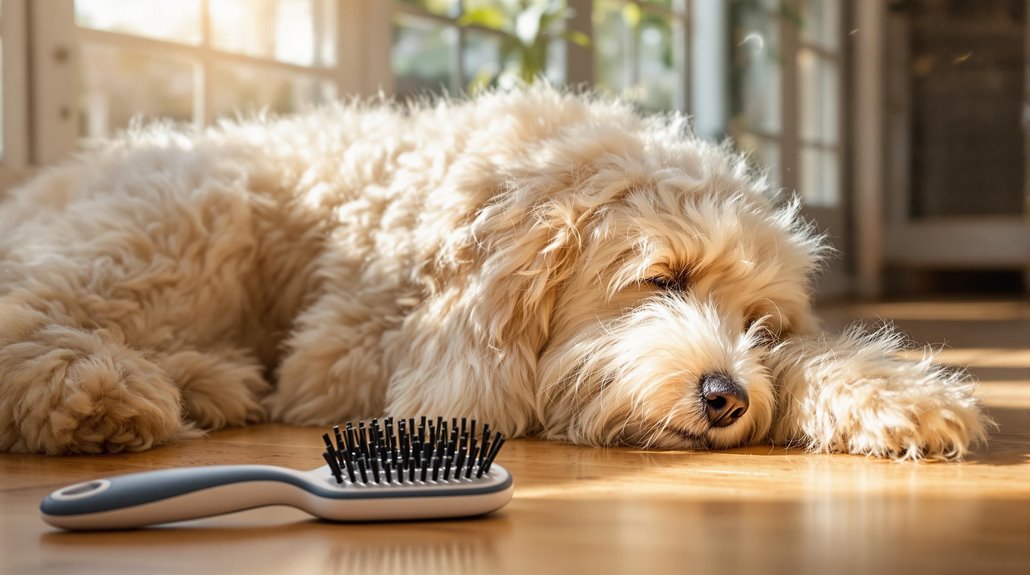
To maintain your Pyredoodle's beautiful coat, regular brushing twice per week is essential. Your Pyredoodle's low-shedding, hypoallergenic coat requires consistent attention to prevent matting and keep their skin healthy. By establishing a regular brushing routine, you'll help distribute natural oils throughout their fur, promoting a shiny and vibrant appearance.
When performing coat maintenance on your Pyredoodle, you'll need the right tools and approach. A slicker brush or sturdy comb will effectively work through their curly or wavy fur. Here's what regular brushing helps prevent and achieve:
- Prevents uncomfortable matting and tangling that can lead to skin problems
- Maintains the hypoallergenic properties of their coat by removing loose hair
- Allows you to check for any skin issues or abnormalities early
- Creates a bonding opportunity between you and your pet
Don't wait until you notice matting to start brushing – prevention is much easier than dealing with established tangles. If you're new to grooming, consider asking a professional groomer to demonstrate proper brushing techniques for your Pyredoodle's specific coat texture.
Annual Veterinary Expenses $1200+
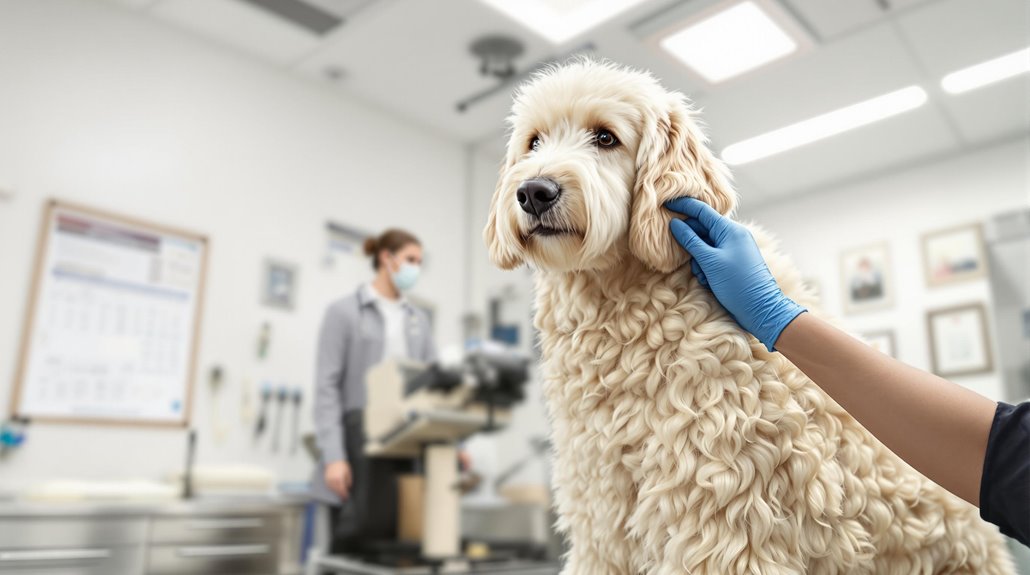
Responsible pet ownership comes with significant healthcare costs, and Pyredoodle parents should budget at least $1,200 annually for veterinary expenses. Your dog's health requires regular check-ups, preventive care, and screenings for potential health issues like hip dysplasia and eye problems.
| Veterinary Service | Approximate Cost |
|---|---|
| Routine Check-ups | $200-300 |
| Vaccinations | $150-250 |
| Dental Cleaning | $300-500 |
| Parasite Prevention | $150-250 |
| Emergency Fund | $400-500 |
You'll need to maintain a consistent schedule of health check-ups to monitor your Pyredoodle's well-being. Due to their mixed breed genetics, they may require more frequent veterinary visits than some other breeds. Consider investing in pet insurance to help manage these costs and provide protection against unexpected health issues.
Your annual veterinary expenses will include:
- Routine wellness exams
- Core and non-core vaccinations
- Dental care and cleanings
- Parasite prevention treatments
- Health screenings for breed-specific conditions
Maintaining regular preventive care helps identify potential problems early, potentially reducing long-term healthcare costs and ensuring your Pyredoodle lives a healthy, happy life.
Research Breeder Certifications First
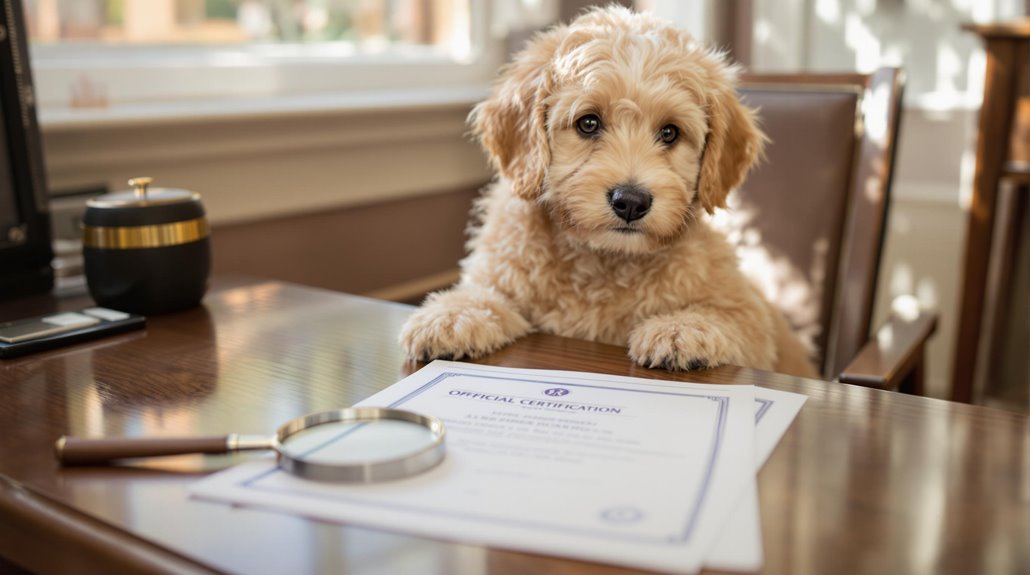
Selecting a certified and reputable breeder is the essential first step in bringing a Pyredoodle into your family. You'll want to verify that your chosen breeder holds certifications from established organizations like the AKC or CKC, which demonstrate their commitment to breeding standards.
When evaluating breeder certifications, focus on these key factors:
- Health clearances for both parent breeds, specifically addressing hip dysplasia and eye conditions
- Documentation of the puppies' lineage and complete health history
- Evidence of regular temperament testing and socialization practices
- Active membership in breed clubs or participation in dog shows
A reputable breeder will openly share this information and encourage your questions about their breeding program. You'll find they're invested in placing their puppies with the right families and maintaining transparency throughout the process.
Don't hesitate to:
- Request references from previous buyers
- Visit the breeding facility if possible
- Review all health certifications personally
- Ask about their ongoing support after adoption
Temperament With Small Pets
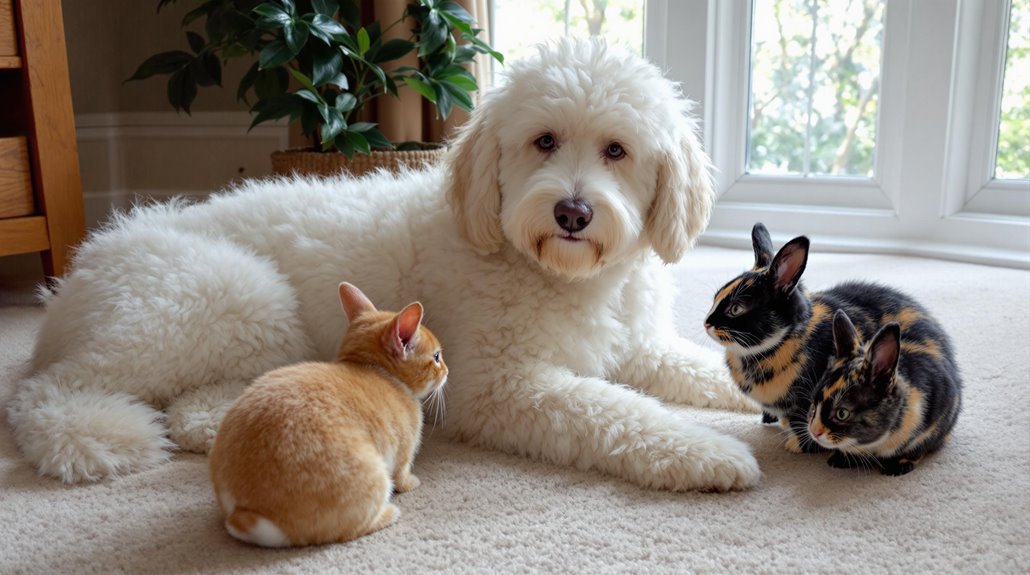
Your Pyredoodle's interactions with small pets will largely depend on proper socialization and training from an early age. These gentle giants naturally possess protective instincts that can work in your favor when introducing them to smaller animal companions.
Key points about Pyredoodles and small pets:
- Their naturally gentle temperament makes them well-suited for multi-pet households
- They exhibit lower prey drive compared to pure Great Pyrenees
- Early socialization helps prevent cautious or uncertain behavior around small animals
- Positive reinforcement during pet interactions builds lasting comfort and trust
To guarantee successful relationships between your Pyredoodle and small pets:
- Begin introductions early in your dog's life
- Supervise all interactions, especially during initial meetings
- Reward calm, gentle behavior around smaller animals
- Create controlled, positive experiences for both parties
While Pyredoodles typically show excellent compatibility with small pets, you'll need to maintain consistent training and supervision. Their intelligence makes them highly trainable, and you can effectively manage any protective instincts through proper guidance. With the right approach, your Pyredoodle can become a reliable guardian for all your family pets.
Frequently Asked Questions
What Is the Personality of a Pyredoodle?
Pyredoodles combine the best personality traits of their parent breeds. You'll find they're affectionate, loyal, and great with families. They've got moderate energy levels and need daily exercise to stay happy. While they're naturally protective, early socialization helps them become confident around strangers. They're highly intelligent and trainable, though they can show some stubbornness. You'll appreciate their gentle nature with loved ones, making them excellent companions for both active families and relaxed households.
Are Pyredoodles Hard to Train?
While your furry friend may occasionally have selective hearing, Pyredoodles aren't typically difficult to train. Their high intelligence level makes them quick learners, though you'll face some training challenges from their Great Pyrenees stubbornness. You'll find success through positive reinforcement with treats and praise. Early socialization importance can't be overstated – start training your pup young to prevent unwanted behaviors. Regular mental stimulation keeps their bright minds engaged and receptive to learning.
Do Pyredoodles Bark a Lot?
No, Pyredoodles don't typically bark excessively. You'll find their barking tendencies are more moderate than their Great Pyrenees parent, making them suitable for various living situations. While they'll alert you to genuine threats, their noise levels are generally manageable. Through consistent training methods and early socialization, you can further minimize any unwanted barking. Breed comparisons show they're quieter than many large guardian breeds, though individual personalities may vary.
Are Pyredoodles Protective?
Yes, Pyredoodles are naturally protective dogs. You'll find their guarding instincts are strong, thanks to their Great Pyrenees heritage. Your Pyredoodle's protective nature shows in their alert monitoring of your home and family, but they won't typically be aggressive. With proper socialization needs met early on, they'll learn to distinguish real threats from normal activities. Their temperament traits make them excellent guardians who'll remain calm yet vigilant in protecting their loved ones.
Conclusion
You'll find that Pyredoodles make wonderful companions if you're prepared for their unique blend of traits and substantial care requirements. Like a gentle knight from medieval times, they'll guard your castle while showering you with affection. Before bringing one home, consider the grooming commitments, training needs, and health expenses. If you've got the time, space, and resources for these majestic hybrids, they'll reward you with unwavering loyalty and companionship.
